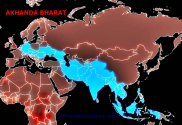How dare you to forget your next door supurpura Bharat!I'm getting worried about the US now. If the US gets too weak too fast it would deprive China of an important motivator for reform and improvement.
Even though Chinese history has shown continuous social and technological improvement since the Shang, eras of backsliding give it a somewhat cyclic feel. China needs a close rival to keep it on its toes to do better. It's better for everyone that way.
You are using an out of date browser. It may not display this or other websites correctly.
You should upgrade or use an alternative browser.
You should upgrade or use an alternative browser.
Miscellaneous News
- Thread starter bd popeye
- Start date
Littered with references to China everywhere. Rent Free.Why Modi Can’t Make India a Great Power
Government-Backed Intolerance Is Tearing the Country Apart
Starting September 9, New Delhi is scheduled to host the G-20’s 18th annual summit. The event, in the eyes of the Indian government, will mark the country’s growing international importance. “During our G-20 presidency, we shall present India’s experiences, learnings, and models as possible templates for others,” Indian Prime Minister Narendra Modi declared last year, when his country assumed the organization’s leadership. This August, he asserted that India’s presidency would help make the world into “one family” through “historic efforts aimed at inclusive and holistic growth.” The government’s message was clear: India is becoming a great power under Modi and will usher in an era of global peace and prosperity.
But 1,000 miles away from New Delhi, in the northeastern state of Manipur, India is caught in a conflict that suggests it is in no position to serve as an international leader. Over the last four months, ethnic violence between Manipur’s largest community, the Meiteis, and its second-largest minority, the Kukis, has killed hundreds of people and rendered 60,000 people homeless. Mobs have set fire to over 350 churches and vandalized over a dozen temples. They have burned more than 200 villages.
"I have altered the deal, pray I do not alter it further."
Japan's Kishida urges China premier to end import ban over Fukushima water

Li Qiang has that boss look too, especially after his meeting with Raimondo.
Littered with references to China everywhere. Rent Free.
Joke’s on them cause Modi will make Bharat a hyper power.
supercat
Colonel
China violated US sanctions? Really? China has to obey US sanctions?More sanctions are coming as the US felt humiliated.

Who says Modi's India can't alleviate poverty?
Littered with references to China everywhere. Rent Free.
I can't believe Gordon Chang didn't patent the "Coming Chinese Collapse".
Interesting omission - another example how Western MSM such as NYT operates:
I can't believe Gordon Chang didn't patent the "Coming Chinese Collapse".
Interesting omission - another example how Western MSM such as NYT operates:
You’d think that they’d get tired of tapping at the same exact headline for three decades but apparently no… Even the laziest of incels find different pron to get off to once in a while. What does that tell you about the work ethics and integrity of Western thinktankies?
If I were Raimondo I'd resign from humiliation. But it appears that she is as thick-skinned as Sullivan, who refused to resign after the Saudi-Iranian fiasco.
Funny, sad , and irritating that the comment sections of many articles/reddit gets close down because of Americans unable to cope or just plain being racist.
A presidential election in the Maldives on Saturday (9 September) could be decisive in determining whether China or India win a competition for influence over the tiny Indian Ocean island chain. While India has longstanding cultural, financial and security ties with the Maldives, China has in recent years invested in infrastructure projects as it builds closer ties and pursues its Belt and Road vision of transport and energy networks.
President Ibrahim Mohamed Solih, who promotes close ties with his country’s huge neighbour with an “India-first” policy, appears to be slightly ahead in the polls.
The coalition backing his main rival, Mohamed Muizzu, has a record of being close to China and has launched an “India out” campaign, promising to remove a small Indian military presence of several surveillance aircraft and some 75 personnel.

